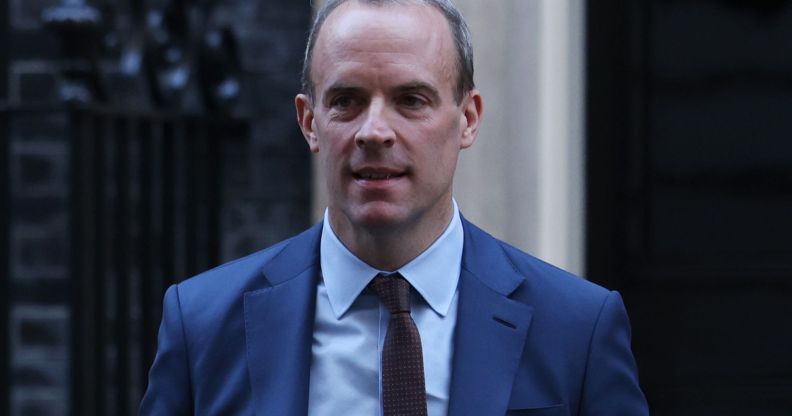Trans women convicted of violence banned from women’s prisons by Tory minister Dominic Raab

Dominic Raab said that safety was his ‘first priority’ when choosing to barr trans women with ‘male genitalia’ from women’s prisons. (Getty)
Trans women with a history of violence will be barred from female prisons, Tory minister Dominic Raab has announced.
The government’s new policy will come into effect from Monday (27 February) after the Ministry of Justice announced amendments in January.
It will prevent trans women who have been convicted of sexual violence, or who have “male genitalia” from entering women’s prisons.
The deputy prime minister and justice secretary Dominic Raab said that “safety has to come first in our prisons” while adding that he believed the policy to set out a “common-sense” approach to handling trans prisoners.
“With these sensible new measures in place, transgender offenders who have committed sexual or violent crimes or retain male genitalia will not serve their sentence in a women’s prison.”
It would also be enforced regardless of whether the trans prisoner has a gender recognition certificate (GRC).
Certain exemptions will reportedly be made but must go through a vetting process that will be signed off by ministers.
data from the Ministry of Justice shows that there are 230 transgender people currently incarcerated out of a population of 78,058.
168 of those 230 transgender prisoners identify as trans women, while 42 identify as trans men, 13 identify as non-binary, and seven identify in a different way or did not provide a response.
According to the MoJ report, 181 of these prisoners were in male estates, while 49 were in female estates.
There were six transgender women in female establishments as of November 2022.
The policy on transgender prisoners came to attention once again following the case of trans woman Isla Bryson.
Bryson was convicted by a court in Scotland of raping two women prior to her transition.
After she was held at the women’s prison Cornton Vale, a public outcry prompted Scottish ministers to move her to a men’s prison.
First minister Nicola Sturgeon said following Bryson’s incarceration: “I don’t see how it’s possible to have a rapist within a female prison, even the understandable public and parliamentary concern.
“I hope that provides assurance to the public presiding officer, not least to the victims, in this particular case.”
An urgent case review found that, while Bryson was in Cornton Vale, women were “at no point” at risk of harm due to management’s handling of the case.
Advocacy group Scottish trans said in a January statement that, while it believed that, in the case of Isla Bryson, the Scottish Prison Service “generated the result it should,” a blanket policy on trans people in custody “would be wrong.”
“In a community of any size, there will be some people who commit appalling crimes,” it continued.
“That does not and should not reflect on the majority of that community.”

